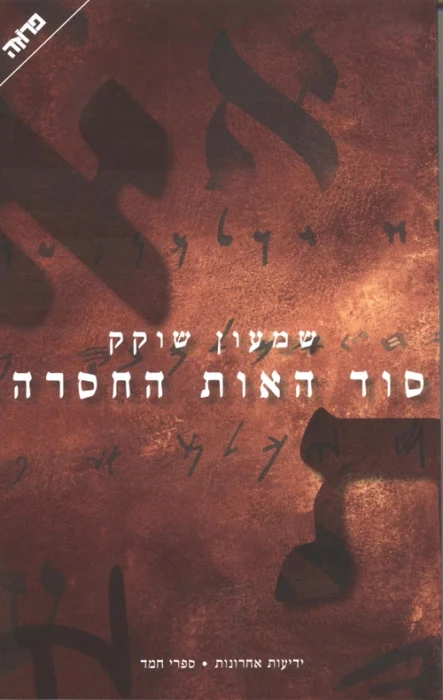Please scroll down for an English review.
סוד האות החסרה הוא רומן קבלי, שפורסם בשנת 2011, העוסק בארבעה מקובלים צעירים מירושלים של המאה העשרים : יהונתן מבורך, רפאל מזרחי, אברם ענתבי ודוד ענתבי , במסע לפענוח האות החסרה בשפה העברית ובהבנת חסרונות הקיום.
יהונתן מבורך, כשמו כן הוא, בורך בכוחות מיסטיים אדירים שמתגלים בו מגיל צעיר. כשהוא לומד שקיימת אות שנעלמה מן הבריאה, אות פלאית שאין יודעים עליה דבר חוץ מכך שהיא הייתה, ושבעתיד היא תשוב ותיגלה , הוא מגייס את כוחותיו ואת הסובבים אותו כדי למצוא אותה. יש במהלך הזה משהו מיתולוגי כמעט: דמות שמחזיקה בידע ובכוח עתיק.
הספר מתחיל טוב. יש בו עומק רוחני, זיקה לקבלה ולמסורת ירושלים, ודמויות מסקרנות שמביאות איתן ניחוח עתיק ותחושת קהילה חזקה. העלילה נבנית מהילדות של הגיבורים, ולרגעים נדמה שהמחבר מחזיק בידיו את היכולת לסחוף את הקורא למסע אמיתי , מסע פנימי עם נגיעה באלמותי.
אבל אז, אחרי ההתחלה המבטיחה, הספר מאבד כיוון. יהונתן מבורך, שהתחיל כדמות עילאית עם כוחות ויכולות מופלאות, הופך לפתע לבחור סתמי שכל ייחודו בכך שוויתר על עולמו הרוחני בשביל אהבת גבר. הבעיה אינה במערכת היחסים עצמה , אלא באובדן ההילה המיסטית והמורכבות של הדמות, שהפכה פתאום לפשוטה ושטוחה, כאילו המחבר ויתר בעצמו על החלום הגדול שהניע את הסיפור.
העלילה מסתחררת סביב עצמה, סבה במעגלים חסרי תוחלת ומתפזרת למחוזות שונים ללא מיקוד. במקום בחינה מדויקת של התהליך הקבלי ושל הפער בין הסוד לאדם שמבקש לפענח אותו, הספר הופך למסע של דיבור פנימי , הרהורים שמתפתלים סביב עצמם בלי מטרה ברורה, עד שהבנתי שהסופר איבד את הפואנטה. הרוחניות נשארת בגדר שבלול של מילים, סוחפת את הקורא לענן חסר כיוון.
יש רגעים יפים, בעיקר בדימויים של ירושלים ובאווירה המיסטית. אבל אלה רגעים בודדים בתוך טקסט שמבזבז את עצמו על עיסוק יתר בעצמו. הקריאה הופכת למאבק , בין הציפייה לתשובות לבין הרעש של עוד ועוד מילים.
בסופו של דבר, נשאר רומן שהתחיל עם הבטחה גדולה, דמות מרתקת וחיפוש אמיתי אחר האות החסרה, אבל התדרדר למונולוגים אישיים שלא נגמרים ולא אומרים דבר חדש. בעיני, זה פספוס צורב.
סוד האות החסרה/ שמעון שוקק
הוצאת ידיעות ספרים, 2011, 311 עמ'
דירוג SIVI –
איכות אודיו –

The Secret of the Missing Hebrew Letter is a 2011 Kabbalistic novel that follows four young Kabbalists from twentieth-century Jerusalem: Yehonatan Mevorach, Rafael Mizrahi, Avram Anatbi, and David Anatbi, in their quest to decipher the missing letter of the Hebrew language and understand the flaws of existence.
Yehonatan Mevorach, true to his name, is blessed with immense mystical powers that reveal themselves from a young age. When he learns of a letter that vanished from creation , a wondrous, secret letter known only by its absence and the promise of its future return, he gathers his strength and those around him to find it. There is something almost mythological in this pursuit: a figure holding ancient knowledge and power.
The novel begins well. It has spiritual depth, a strong connection to Kabbalah and Jerusalem’s tradition, and intriguing characters with an ancient fragrance and a sense of communal purpose. The narrative builds from the heroes’ childhood, and for a moment it seems as if the author holds in his hands the power to draw the reader into a truly immersive journey – an inner journey with a hint of the eternal.
But then, after this promising beginning, the novel loses its way. Yehonatan Mevorach, who started as an exalted figure with remarkable powers, suddenly becomes an ordinary man whose only distinction is that he abandoned his spiritual world for the love of another man. The issue isn’t the relationship itself, which, honestly, appears abruptly and without much explanation, but rather the surrender. The fact that this character, who was supposed to carry the story’s mythic weight, suddenly becomes shallow and plain, as if the author himself abandoned the grand dream that propelled the plot.
The narrative spirals around itself, moving in aimless circles and scattering into different directions without focus. Instead of a precise exploration of the Kabbalistic process or the gap between the secret and the seeker, the book turns into a journey of internal monologue, thoughts twisting around themselves without a clear goal, until I realized the author had simply lost the point. The spirituality remains a snail’s shell of words, sweeping the reader into a cloud without direction.
There are beautiful moments, especially in the imagery of Jerusalem and the mystical atmosphere. But they’re rare , brief glimpses in a text that wastes itself on endless self-absorption. Reading becomes a struggle between the expectation for answers and the noise of more and more words.
In the end, what remains is a novel that began with a grand promise, a fascinating character, and a real search for the missing secret, but it collapses into endless internal tangents that say nothing new. For me, it’s a bitter disappointment.
לגלות עוד מהאתר Sivi's Books
Subscribe to get the latest posts sent to your email.

